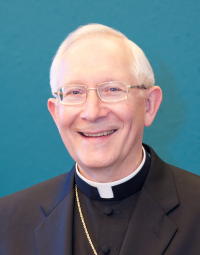
Archbishop Leonard P. Blair
St. Augustine once referred to words as “precious cups of meaning” from which we are given to drink in a way that is life-giving. Indeed, as Christians, we profess our belief that “the Word became flesh.” That word, as we profess in the creed, is Jesus himself spoken eternally by the Father. And as the Word who became flesh for our salvation, he is “the way, and the truth and the life.” Of all people, Christians ought to have a tremendous reverence for the spoken and written word. At the end of January, Pope Francis had us honor in a special way at Mass the presence of God’s Word in holy Scripture. It is Catholic belief that at Mass Christ comes to us both in the Liturgy of the Word and the Liturgy of the Eucharist. The real presence of Christ in the Eucharist does not at all diminish the reality of his voice here and now in the Scriptures. The devil knows how to use words too, as we see at the beginning of the Book of Genesis, but words perverted for falsehood and evil, not truth and life. One thinks of the battered and brutalized Christ on the eve of his death being assaulted by malicious and false words inspired by the devil, accusations by false witnesses, and yet Jesus “opened not his mouth.” In this world, we are subjected to two voices, the voice of God and the voice of the evil one, as the New Testament makes abundantly clear. The notion that Satan and his works are a myth is his greatest weapon. Today, the spiritual battle of which Sts. Peter and Paul speak in their letters rages all around us, and those who would prefer to close their eyes and think only “happy thoughts” (let’s not frighten the children) are in danger of being dangerously misled. Pope Francis is keenly aware of this and speaks of it starkly and more often than many people care to acknowledge.
We no longer live in a world of solitude and silence from which words can thoughtfully arise. The very atmosphere around us is saturated with words streaming from every conceivable source. Truth and falsehood, news and so-called “fake” news, facts and fabrications, claims and counter claims, proper context and willful distortion, perspective and ideological blindness, rationality and irrationality, objectivity and prejudice, persuasion and imposition — all of this swirls around us. It is more crucial than ever that we exercise prudence and discretion, rather than allowing ourselves to make rash judgments or be carried away by everything we hear. St. John writes: “Beloved, do not believe every spirit, but test the spirits to see whether they are from God, because many false prophets have gone out into the world. (1 Jn 4:1) Our ultimate confidence and consolation also find expression in St. John when he writes: “In the beginning was the Word, and the Word was with God, and the Word was God … In him was life, and the life was the light of men. The light shines in the darkness, and the darkness has not overcome it.
